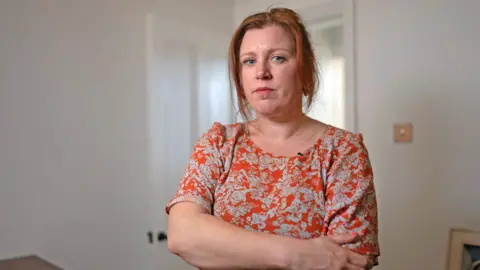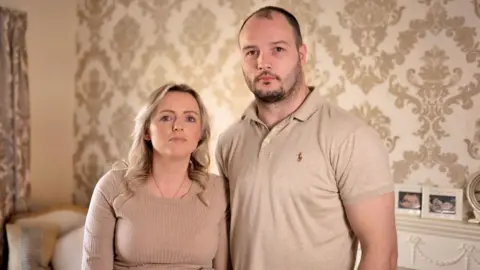 BBC
BBCWhen Tassie Weaver went into labour at full term, she thought she was hours away from holding her first child. But, by the time she was giving birth, she knew her son had died.
Doctors had previously told Tassie to call her local maternity unit immediately when she went into labour, she says, because her high blood pressure and concerns about the baby’s growth meant she needed monitoring.
But when she first phoned, despite being considered high risk, a midwife told her to stay at home.
Three hours later, worried she now could not feel her baby moving, she called again. Once more the same midwife told her to stay put – saying this was normal because women can be too distracted by their contractions to feel anything else.
“I was treated as just a kind of hysterical woman in pain who doesn’t know what’s going on because it’s their first pregnancy,” the 39-year-old tells us.
When she rang a third time, a couple of hours later, a different midwife told her to come to hospital straight away, but by the time she arrived it was too late. Her son’s heart had stopped beating.
Tassie and her husband, John, believe Baxter’s stillbirth four years ago at Leeds General Infirmary (LGI),could have been prevented. A review by the NHS trust that runs the hospital identified care issues “likely to have made a difference to the outcome”.
The couple are among 47 new families who have contacted the BBC with concerns about inadequate maternity care at Leeds Teaching Hospitals (LTH) NHS Trust between 2017 and 2024. These include parents who told us their babies died or had been injured, and women who described injury and trauma following inadequate care.
They had all seen our January investigation into the potentially avoidable deaths of 56 babies and two mothers at the trust between 2019 and 2024.
Responding to the latest concerns, LTH told the BBC it was “deeply sorry” that families had been let down by the care they had received. It said it recognised it needed to make improvements.
The trust had taken “clear steps to make real and lasting changes”, said its chief medical officer Dr Magnus Harrison, since unannounced inspections in December 2024 and January 2025 by England’s regulator, the Care Quality Commission (CQC).
“We are investing in our workforce, focusing on consistently safe staffing levels, and strengthening our culture to prioritise openness, compassion and respect,” he added.
As well as the new families, three more whistleblowers – in addition to the two in our first investigation – have also shared concerns about the standard of care at LTH maternity units, at LGI and St James’ University Hospital.
Both sites are rated “good” by the CQC, but all the whistleblowers believe that rating does not reflect reality.
There is a problem with the culture, one senior staff member told us. “People [staff] are scared to raise concerns because nothing ever happens when they are raised. So there’s a ‘what’s the point’ attitude.”
There were also 107 clinical claims made against LTH for obstetric-related deaths and injuries between April 2015 and April 2024, the BBC has learned via a Freedom of Information request to NHS Resolution – the health service’s insurance arm.
More than £71m was paid during this period including for 14 stillbirths, and 13 fatalities involving mothers or babies, including Tassie’s son, Baxter.
‘The door is definitely unlocked’
A total of 67 families have now told the BBC they experienced inadequate care at LTH’s two maternity units. All want an independent review into the trust’s maternity services – and a group of them have asked Health Secretary Wes Streeting for senior midwife Donna Ockenden to lead it.
Some Leeds families also joined others from across England this week, to urge Mr Streeting to hold a national inquiry into maternity safety.
On Tuesday, he met parents who said they “got a very clear message” that he was considering one. Jack Hawkins, whose daughter Harriet died in 2016 in Nottingham, told us afterwards: “The door is definitely unlocked. It’s the only way we can improve what’s going on.”
Mr Streeting had told a different group on Monday, however, that he would not hold an inquiry, preferring instead to announce a separate plan – opposed by families – to improve safety.
The BBC understands such a plan would include an improvement taskforce led by non-NHS officials, a buddying system between poorly performing and better trusts, and a restorative justice approach where hospitals and families would meet and vow to be open and honest.
Mr Streeting continues to meet bereaved families “to best understand how we can improve maternity services as swiftly as possible”, a Department of Health and Social Care spokesperson said in a statement.
“We are finalising measures to strengthen leadership and build a culture rooted in safety, respect, and compassion in maternity services,” they added.
‘I knew we needed help’
Tassie’s care was graded “D” – the lowest possible – by the trust’s review team.
It confirmed “the mother presented with reduced fetal movements but management was not appropriate”.
“I knew that me and my baby needed help, and I tried to communicate that as clearly as I could, and I didn’t get that help,” Tassie says.
“I had another 17 hours in labour… having to sign consent forms for a post mortem whilst having contractions trying to deliver my son, who I knew wasn’t alive.
“That’s not something anyone should ever have to do.”
Given her combined risks, Tassie should have been offered an induction earlier, at 39 weeks, concluded the review group.
The trust told us it offered “sincere apologies and condolences” to Ms Weaver and her family for their “distressing experiences and loss”.
“Immediate internal and external reviews of the care provided were undertaken and we made a number of changes as a result of this tragic case,” added Dr Harrison.

Common themes were expressed repeatedly by the latest families to contact us – including women feeling like they had not been listened to when they raised concerns, a lack of compassion, and families saying the trust made them feel like they were alone in their experience.
One couple paid an undisclosed settlement by NHS Resolution on behalf of the trust was Heidi Mayman and her partner Dale Morton.
Heidi gave birth to their first daughter Lyla in 2019, two years before Tassie gave birth to Baxter. Lyla died aged four days.
Heidi believes her concerns were not taken seriously during her “traumatic” labour. Lyla was born in poor condition about 37 hours after Heidi says she first called the LGI’s maternity assessment centre, reporting blood and fluid loss.
Heidi says she repeatedly raised concerns about reduced fetal movements and worsening pain and, like Tassie, made multiple calls before being advised to attend.
“I just wish she [Lyla] were here. I feel like it’s just ruined our lives, I’ll never get over it,” Heidi told us.
The protocols the midwives had failed to follow were outlined, along with future safety recommendations, in an external investigation by the Healthcare Safety Investigation Branch (HSIB).
Lyla’s dad, Dale says the investigation reads “just like a catalogue of errors”.
‘Swept under the carpet’
In January, we reported that 27 stillbirths and 29 neonatal deaths at LTH between 2019 and mid-2024 – plus two deaths of mothers – had been judged to have been potentially preventable by a trust review group.
The deaths reviewed included babies with congenital abnormalities – and newborns and mothers transferred after birth for specialist care. The trust said in response to our initial story that the number of potentially-avoidable neonatal deaths had been “very small”.
A senior clinical staff member working at the trust – one of the new whistleblowers – told us inadequate staffing levels had led to what they described as “near misses”.
They also said a baby had died unnecessarily on one occasion, because issues had not been recognised earlier during the mother’s labour.
The trust does not “learn from their mistakes”, they added, and often things are “swept under the carpet”.
‘Taking concerns very seriously’
A full report of the CQC’s findings following its inspections of the trust’s maternity and neonatal services, including all action it has told the trust to take, is due to be published shortly.
The trust was given immediate feedback regarding urgent concerns which required action to address identified risks, the CQC told us. It also took enforcement action requiring the implementation of safe staffing levels.
Two months after our report in January, NHS England placed LTH under its maternity safety support programme (MSSP) which works to improve trusts where serious concerns have been identified.
“We are taking the concerns raised by families about the quality and safety of maternity care in Leeds incredibly seriously,” chief midwifery officer for England, Kate Brintworth, told us.
LTH’s Dr Magnus Harrison said in a statement: “We are fully committed to ensuring that every family receives safe, respectful and compassionate care. We recognise we need to make improvements.”
He added: “We have commissioned an independent external review to complement NHS England’s Peer Quality Review of our neonatal services, so that we can better understand the data on neonatal outcomes.”
Do you have more information about this story?
You can reach Divya directly and securely through encrypted messaging app Signal on: +44 7961 390 325, by email at divya.talwar@bbc.co.uk, or her Instagram account.

Get our flagship newsletter with all the headlines you need to start the day. Sign up here.

